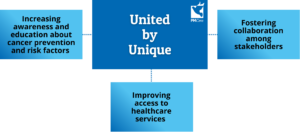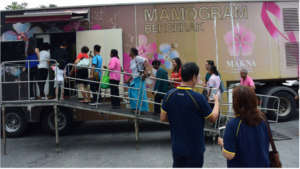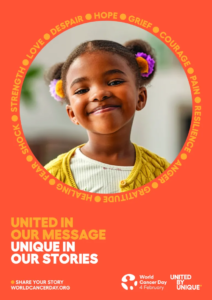World Cancer Day
By Dr Helmi Ismail, Medical Advisor of PMCare
Most of us have heard of cancer, and a great many have known someone who has had cancer. This someone may be a national figure, a celebrity, or a family member. A few might even have been diagnosed with cancer. The closer this someone is to us, the more profound its effect on us – it triggers an emotional response, unlike other life issues. This emotional journey of anger, despair, fear, grief, and shame may be complemented by hope and courage, even gratitude, as some develop strength and resilience. It is a unique and personal journey for each and every one of us.
Cancer is a leading cause of death worldwide, accounting for nearly 10 million deaths in 2020. The most common in 2020 (in terms of new cases of cancer) were: breast (2.26 million cases); lung (2.21 million cases); large intestine i.e. colon and rectum (1.93 million cases); prostate (1.41 million cases); skin (non-melanoma) (1.20 million cases); and stomach (1.09 million cases).
World Cancer Day
February 4th is World Cancer Day. It is celebrated annually to serve as a reminder of the ongoing battle against cancer, a disease that affects millions globally. In 2025, this day should take on even greater significance as countries, organizations, and individuals unite to raise awareness, promote education, and advocate for better access to care. The theme for World Cancer Day 2025 is United by Unique.

This article will explore the importance of World Cancer Day 2025, the progress made since previous observances, and the actions necessary to Unite people through their Unique experiences in the fight against cancer.
The significance of World Cancer Day lies in its ability to mobilize communities and inspire collective action against cancer. This day provides an opportunity to engage in meaningful discussions about cancer prevention, treatment options, and the importance of early detection. We hope you too will undertake this challenge. Together we can support World Cancer Day 2025 to serve as a platform to showcase successful community initiatives that have effectively addressed these disparities and to encourage the implementation of best practices globally.
United by Unique
Since the inception of World Cancer Day in 2000, considerable progress has been made in understanding cancer and improving patient care. Advances in medical research have led to the development of innovative therapies, early detection methods, and personalized medicine approaches that have transformed the landscape of cancer treatment. However, despite these advancements, significant gaps remain, particularly in low- and middle-income countries where resources are limited and healthcare infrastructure may be inadequate. Even in Malaysia, there is a wide disparity of access to facilities and care across the states and communities. To unite the community, several actions must be prioritized.

1) Increasing awareness and education about cancer prevention and risk factors is crucial. Public health campaigns must focus on promoting healthy lifestyles, such as maintaining a balanced diet, engaging in regular physical activity, and avoiding tobacco use. Additionally, increasing screening programs can facilitate early detection, which is vital for improving survival rates. By ensuring that communities are informed and empowered to make healthier choices, we can significantly reduce cancer incidence and mortality.
2) Improving access to healthcare services is essential. Government ministries and healthcare providers must invest in strengthening healthcare systems, particularly in underserved areas. This includes increasing the availability of cancer screening and treatment facilities, ensuring an adequate supply of essential medicines, and training healthcare professionals in the latest cancer care protocols. Telemedicine can also play a pivotal role in bridging the gap, allowing patients in remote areas to access specialist consultations and support without the burden of travel.
3) Fostering collaboration among stakeholders, including governments, non-profit organizations, and the private sector, is vital for driving meaningful change. By working together, these entities can pool resources, share knowledge, and develop comprehensive policies that address the multifaceted challenges of cancer care. Initiatives such as research funding, awareness campaigns, and community outreach programs can amplify the impact of individual – you and I – efforts and create a more coordinated response to cancer globally.


Cancers not only occur in the elderly but also in adolescents and children. Investment in children’s upbringing will also affect the likelihood of cancers in adult life, like the HPV (Human Papilloma Virus) Vaccine.
PMCare with its drive to Enriching Quality of Life particularly among its members (employees and registered dependents) and the community as a whole, calls upon all to rethink life priorities.
Working Towards a Better Future
World Cancer Day 2025 presents a unique opportunity to reflect on the progress made in cancer care while acknowledging the work that remains to be done. The drive to be “United by Unique” will serve as a catalyst for action, encouraging individuals and organizations to advocate for equitable access to cancer prevention, treatment, and support.

By increasing awareness, improving healthcare access, and fostering collaboration, we can work towards a future where every individual, regardless of their background or circumstances, has the opportunity to receive quality cancer care. Let us commit to taking the necessary steps to save lives.

